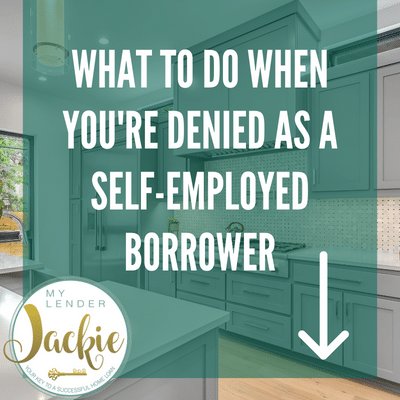
We understand that self-employed people are ambitious and creative entrepreneurs, and we have creative solutions to match. If you’ve been denied for a mortgage somewhere else, here’s what you need to do.
What to Do When You’re Denied as a Self-Employed Borrower
1. Find out why you were denied
If possible, start by looking at the reason you were not approved for the mortgage. While many self-employed borrowers find challenges with a mortgage approval because their tax returns do not fully represent their income, there might be more to the picture.
In some cases, you may have been denied based on your credit score. Our mortgage solutions for self-employed borrowers require a 680 credit score, but if your score needs a boost there are a few things you can do to help, and they may be easier than you thought:
- Address your credit utilization rate. This is the percentage of your credit limit that is being carried as a balance. For example, if you have a $5,000 credit limit and you are carrying a $2,500 balance each month, that account has a 50% utilization rate. It will be best for your credit score to keep your utilization rate below 25%. Work toward this goal from both directions by paying down the balance as quickly as you can, and by asking for a credit limit increase.
- Set up automatic payments on your debt accounts. Making late payments not only results in wasted money because of late fees, but it can greatly affect your credit score. If you know you have a tendency to miss a payment, set up automatic recurring payments everywhere you can.
- Check your credit report for any errors, and take the time to dispute them. This can be a lengthy process, but your patience will pay off if you have a ding on your credit that does not belong there.
If credit is not the issue, you may simply not be able to qualify for the loan because of your self-employed status. In that case, we can help.
Bank Statement Loans
Bank Statement Loans, also known as self-employed loans or non-QM (Non-Qualified Mortgage) loans, are a type of mortgage that allows self-employed individuals or business owners to qualify for a home loan using their bank statements, rather than traditional income documentation such as W-2 forms or tax returns. This type of loan is particularly useful for individuals who have difficulty providing standard income documentation but have a steady income stream.
We offer bank statement loans as a creative financing solution for our self-employed applicants, with more flexible requirements that put homeownership within reach when it may not have been before.
How to Qualify for a Bank Statement Loan
To apply for a bank statement mortgage, all we need is:
- 680 minimum credit score
- Personal Bank Statement qualified based on 12 month average monthly deposits
- or
- Business Bank Statement qualified based on 24 month average monthly deposits
There are multiple options to suit your needs, including 5/1 ARM, 7/1 ARM , and 10/1 ARM, as well as 15 year fixed and 30 year fixed. Even if you have concerns that you may not be able to qualify because of a recent foreclosure or bankruptcy, take a few minutes to talk with one of our loan officers. You may be surprised just how flexible we can be as we partner with you to reach your goals.
Ready to learn more about applying for a bank statement mortgage? Contact us any time to learn more about how we can help self-employed borrowers achieve their goals in real estate.

